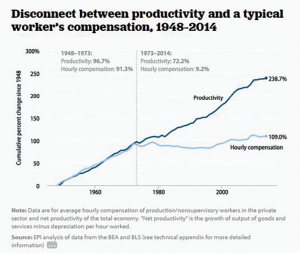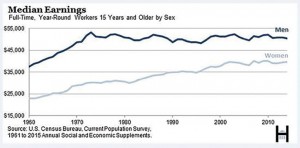by Alexander Roberts
Capitalism has had a tough year. It isn”™t just because of Pope Francis, who said last month that unfettered capitalism is “the dung of the devil,” or even that avowed socialist Bernie Sanders is attracting the biggest crowds of any presidential candidate in Iowa. Capitalists themselves show signs of shaken faith. Billionaire Nick Hanauer has a popular TED Talk in which he tells his fellow plutocrats that unless income inequality is tamed, “The pitchforks are coming for us.”
Rising inequality and the growing share of the wealth taken by the upper class have put the “job creators” on the defensive. Mitt Romney, who dismissed the 47 percent “dependent on government” during the last presidential campaign, recently observed, “The rich have gotten richer, income inequality has gotten worse and there are more people in poverty than ever before.” Senator Ted Cruz said, “Today, the top 1 percent earn a higher share of our national income than any year since 1928.” Both blamed Obama, as if Republican policies are more likely to “spread the wealth.”
Stagnating wages for the many, windfalls for the few.
Business groups have weakly objected that a high minimum wage might seriously impact job creation but their relatively tepid response to wage-hike proposals belies shaken confidence in the free enterprise system. It took another hit this month with new U.S. Census Bureau statistics.
 The bureau, according to Brookings, reported that the typical male worker earned less in 2014 than in 1973, despite huge rises in productivity. Not even the most die-hard capitalist can defend such an inequitable distribution of wealth, with the top 1 percent seeing its income more than double to over $1.5 million per year in the same period.
The bureau, according to Brookings, reported that the typical male worker earned less in 2014 than in 1973, despite huge rises in productivity. Not even the most die-hard capitalist can defend such an inequitable distribution of wealth, with the top 1 percent seeing its income more than double to over $1.5 million per year in the same period.
The movement to enact so-called “living wage” laws poses the greatest challenge to capitalism and freedom precisely because it has generated so little opposition.
Capitalism, where the means of production are privately owned, remains the greatest generator of wealth in the world. But it also generates inequality as individuals who work harder or smarter or who cheat or have better luck than others, reap greater rewards. It has buried competing systems that rely on government instead of the free market, including the defeated Soviet Communist system, famously described as “We pretend to work and they pretend to pay us.”
However, capitalism must operate in a moral framework or it loses its legitimacy. If the free market produces widespread poverty and extreme concentration of wealth, it will not survive and Nick Hanauer is right.
The question, however, is how to smooth capitalism”™s rough edges without curtailing freedom and free enterprise.
Capitalism”™s quick fix
Gaining traction across the country is a quick fix: simply raise the minimum wage to a “living wage.” Minimum wage laws have typically been just that””the bare minimum that in many parts of the country, including Westchester, don”™t even cover the minimum needs for food, clothing and shelter of a single worker. The National Low Income Housing Coalition notes that for 2015,
“There is no state in the U.S. where a minimum-wage worker working full time can afford a one-bedroom apartment at the fair market rent.”
The coalition notes that in Westchester County, the “housing wage,” defined as the amount of income required to afford the typical two-bedroom apartment at the fair market rent, is $30.60 an hour. That”™s the ninth highest in the country. The housing wage for Stamford-Norwalk in Connecticut is even higher at $37.37 an hour, the second highest in the nation.
So, with the New York state minimum wage slated to increase to $9 on Jan. 1, it”™s still far below anything on which a worker might live and only tinkers with operation of the free market.
Enter the governor”™s push for the $15 minimum wage, highest of any state in the nation. Bypassing the Legislature, Governor Cuomo plans to impose the $15 per hour wage by fiat in 2019 in New York City and 2021 in the rest of the state for fast-food workers.
Why fast-food workers?
Why fast-food workers are entitled to special status has never been adequately explained. Why not veterans or home health care aides, or bank tellers? One of the strengths of the free market is that it rewards productivity and not privileged classes.
 The answer to inequality may not be legislated wages, which represent a tax on all of us and a major abrogation of market economics. I might be okay with paying this tax for a single mother with two kids, but not for Warren Buffet”™s teenage grandson working a summer job. Perhaps the Earned Income Tax Credit might be a better way to “spread the wealth” than wage and price controls, which proved disastrous during the Nixon administration. Certainly, there should be a serious study.
The answer to inequality may not be legislated wages, which represent a tax on all of us and a major abrogation of market economics. I might be okay with paying this tax for a single mother with two kids, but not for Warren Buffet”™s teenage grandson working a summer job. Perhaps the Earned Income Tax Credit might be a better way to “spread the wealth” than wage and price controls, which proved disastrous during the Nixon administration. Certainly, there should be a serious study.
The point is that we are heading into uncharted territory by substituting a living wage for a minimum wage and while we must make capitalism fairer, dictating wages that far exceed a worker”™s value in a free market may create more problems than it solves.
Alexander Roberts is executive director of the fair housing group Community Innovations Inc., headquartered in White Plains. Contact him at aroberts@chigrants.org or 914-683-1010.



















